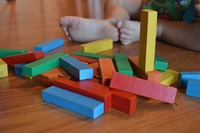7 Tips to Prepare Your Child for Preschool
11th Aug 2015
 As the school season approaches, you might be putting your
child in half-day preschool all year. Or maybe your child is still too young
for kindergarten, but starting preschool anyway. As you make the transition, use
these tips:
As the school season approaches, you might be putting your
child in half-day preschool all year. Or maybe your child is still too young
for kindergarten, but starting preschool anyway. As you make the transition, use
these tips:
1. Adjust to school schedule early
It’s no big deal to let your child sleep until whenever she likes when there’s nowhere to be, but when school starts, everyone has to be up in the morning on time. Start practicing with this schedule at least two weeks before schools starts.
2. Talk about it often… but not too much
Mention preschool often and all the fun your child will have with all the other children and the teachers. Try to make it a normal thing so she won’t be overwhelmed by all the new experiences. For example, say, “When you go to preschool, you’ll hear a story on the carpet just like this.” However, don’t push it too hard or you’ll make it out to be too big of a life event and cause pressure.
3. Encourage questions
To get the most out of the learning experience, children need to engage and ask questions. Encourage your child to ask questions all the time about anything that interests them. Don’t become annoyed with endless questions – your child is just curious!
4. Socialize your child
Preschool means spending a lot of time with other children. It’s best that your child has some experience with this before school time. Visit with your friend’s children at least once a week so your child practices playing with someone else her age.
5. Be prepared for separation anxiety
Separation anxiety is a real thing, but all children get over it. There might be a few tears, but learning how to behave and act when mom or dad isn’t around is a big part of growing up. Assure your child that you’ll be back later in the day to pick her up, say I love you, give a hug, and leave. Long goodbyes just make it more difficult.
6. Read together every day
Reading is a huge part of learning. Teachers will involve reading every day, so make sure it’s a big part of play time as well. Read storybooks together and have your child “read” to you by telling the story based on the pictures.
7. Practice listening
Your child will need to know how to listen carefully without interrupting in school. Play games where your child quietly listens and relays the sounds she hears to you. You could also play games where you give a series of commands (“jump twice, spin three times, and then sit down”) to practice listening to instructions.
Written by Alicia Overby - Founder & President of Baby Elephant Ears
Alicia is wife, mother, and creator of Baby Elephant Ears. Baby Elephant Ears was created out of parental concern, not financial desire. In 2005, when their second child was an infant, he cried all the time and just couldn't seem to get comfortable.
After seeking advice and suggestion from the medical community and alternative medicine, they eventually ended up in the chiropractors office where their baby was successfully treated for asubluxation, discomfort most likely the result of the strain during labor, which was now being exacerbated by the normal lack of infant neck strength. Only proper neck, head, and back alignment would offer him relief. When they couldn't find a product to give their baby the necessary support, Alicia took matters into her own hands and crafted her own infant support pillow. The first Baby Elephant Ears was born!
For more information, visit www.babyelephantears.com.
Interested in writing a guest blog for Baby Elephant Ears? Send your topic idea to pr@babyelephantears.com.
All data and information provided on this site is for informational purposes only. Baby Elephant Ears makes no representations as to accuracy, completeness, current-ness, suitability, or validity of any information on this site and will not be liable for any errors, omissions, or delays in this information, or any losses, injuries, or damages arising from its display or use. All information is provided on an as-is basis.


